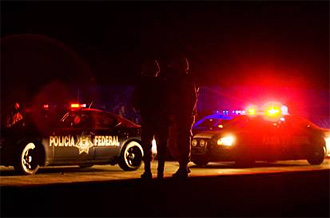
|  |  |  Editorials | Issues | January 2009 Editorials | Issues | January 2009  
Top Mexico Cops Charged with Links to Cartels
 David Gregory - MSNBC David Gregory - MSNBC
go to original


| | Soldiers patrol as federal police vehicles are inspected at a military check point on the outskirts of Tijuana, Mexico, on Thursday. Mexico's drug war has brought a surge in violence, with more than 5,300 gang killings reported in 2008. (Guillermo Arias/AP) |  |
Mexico City - President Felipe Calderon's war on drug trafficking has led to his own doorstep, with the arrest of a dozen high-ranking officials with alleged ties to Mexico's most powerful drug gang, the Sinaloa Cartel.

The U.S. praises Calderon for rooting out corruption at the top. But critics say the arrests reveal nothing more than a timeworn government tactic of protecting one cartel and cracking down on others.

Operation Clean House comes just as the U.S. is giving Mexico its first installment of $400 million in equipment and technology to fight drugs. Most will go to a beefed-up federal police agency run by the same people whose top aides have been arrested as alleged Sinaloa spies.

"If there is anything worse than a corrupt and ill-equipped cop, it is a corrupt and well-equipped cop," said criminal justice expert Jorge Chabat, who studies the drug trade.

U.S. drug enforcement agents say they have no qualms about sending support to Mexico.

"We've been working with the Mexican government for decades at the DEA," said Garrison Courtney, spokesman for the Drug Enforcement Administration. "Obviously, we ensure that the individuals we work with are vetted."

Long-suspected ties

Agents who conduct raids have long suspected Mexican government ties to Sinaloa, and rival drug gangs have advertised the alleged connection in banners hung from freeways. While raids against the rival Gulf cartel have netted suspects, those against Sinaloa almost always came up empty — or worse, said Agent Oscar Granados Salero of the Federal Investigative Agency, Mexico's equivalent of the FBI.

"Whenever we were trying to serve arrest warrants, they were already waiting for us, and a lot of colleagues lost their lives that way," Salero said.

The U.S. government estimates that the cartels smuggle $15 billion to $20 billion in drug money across the border each year.

Over the last five months, officials from the Mexican Attorney General's office, the federal police and even Mexico's representatives to Interpol have been detained on suspicion of acting as spies for Sinaloa or its one-time ally, the Beltran Leyva gang. An officer who served in Calderon's presidential guard was detained in December on suspicion of spying for Beltran Leyva.

Gerardo Garay, formerly the acting federal police chief, is accused of protecting the Beltran Leyva brothers and stealing money from a mansion during an October drug raid. Former drug czar Noe Ramirez, who was supposed to serve as point man in Calderon's anti-drug fight, is accused of taking $450,000 from Sinaloa.

Most of such tips are coming from a Mexican federal agent who infiltrated the U.S. embassy for the Beltran Leyva drug cartel. No such infiltrators have been found for the Gulf cartel, which controls most drug shipments in eastern Mexico and Central America. Sinaloa controls Pacific and western routes.

The DEA's Courtney agrees that there has been a greater crackdown on the Gulf Cartel in both the U.S. and Mexico, with more than 600 members of the gang arrested in September. But he declined to answer questions about Mexico favoring Sinaloa. |

 |
|  |



